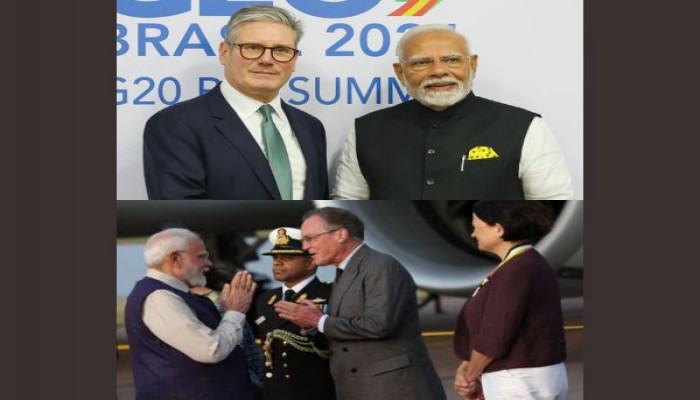India-UK historic FTA, renew comprehensive strategic partnership
- In Reports
- 07:45 PM, Jul 24, 2025
- Myind Staff
India and the United Kingdom signed a significant Free Trade Agreement on 24th July, 2025. This is India's first large bilateral trade deal with a developed nation in over a decade.
British Prime Minister Keir Starmer welcomed Prime Minister Narendra Modi, ahead of the expected signing of a major UK-India Free Trade Agreement that could strengthen economic ties and deepen the strategic partnership between the two countries.
The meeting was held at the historic Hawtry Room, where both leaders engaged in a bilateral discussion to finalise the details of what is being called India’s most wide-ranging trade agreement and the UK’s most significant deal since Brexit.
Just hours before the meeting, Keir Starmer described the India trade agreement as a “Plan for Change in action”.
In a post on X, Starmer said, "A landmark agreement with India brings jobs, investment and growth here in the UK. It will create thousands of British jobs, open up new opportunities for businesses and put money in the pockets of working people."
According to a statement from the British High Commission, the deal is expected to raise two-way trade by £25.5 billion each year. It is also projected to generate thousands of jobs, lower tariffs, and improve market access for businesses in both countries.
During Prime Minister Modi’s visit, the two leaders are also expected to launch the UK-India Vision 2035. This is a renewed Comprehensive Strategic Partnership that outlines plans for collaboration on national security, education, technology, climate change, and defence.
Prime Minister Keir Starmer said, "This historic trade deal with India is a huge victory for Britain. It will create British jobs by the thousands across the UK, open doors to new opportunities for businesses, and boost growth in every part of the country."
He added that the agreement forms part of his “Plan for Change” to raise living standards and support families in managing the cost of living.
The agreement follows almost three years of negotiations and will become operational within a year, once the UK Parliament and India's Union Cabinet approve.
In alcoholic beverages, duties on Scotch whisky and gin will decrease from 150 per cent to 75 per cent immediately, and further decrease to 40 per cent over a period of ten years.
For automobiles, the tariffs of over 100 per cent currently levied on British vehicles will be reduced to 10 per cent under a quota-based entry system.
On other goods, India will reduce or eliminate tariffs on such goods as cosmetics, salmon, chocolates, biscuits, and medical equipment.
Almost 99 per cent of Indian products will have duty-free access to the UK. These include products in industries such as textiles, footwear, jewellery, auto components, machinery, chemicals, sports equipment, furniture, and pharma.
In apparel and textiles, the UK's 8 to 16 per cent tariffs that prevail now will be dismantled. This is expected to benefit exporters from large centres like Surat, Tiruppur, and Ludhiana. Businesses like Welspun India and Arvind Ltd will gain.
In footwear, zero-duty access will benefit producers in locations such as Agra, Kanpur, and Chennai. This will come as a welcome relief for firms like Relaxo and Bata India.
In cars and electric vehicles, Indian firms that produce EVs and hybrid vehicles, including Tata Motors and Mahindra Electric, will benefit from reduced import duties and special quotas.
In gems and jewellery, elimination of levies in the UK, which are now up to 16 per cent, will favour exporters, particularly in Gujarat and Maharashtra.
In engineering goods and auto parts, the elimination of tariffs will be beneficial to companies such as Bharat Forge.
Indian pharmaceutical and medical equipment industries will gain improved access to the UK market.
In furniture, toys, sporting equipment, chemicals, and machines, lower or zero tariffs will benefit exports from these industries.
In spirits and high-end products, British companies like Diageo that export Scotch whisky and luxury automobile manufacturers like Aston Martin and Jaguar Land Rover, owned by Tata Motors, will gain easier access to the Indian market.
In the auto industry, the UK's premium cars will enter India under a quota regime with reduced tariffs.
In professional services, Indian employees such as yoga teachers, cooks, musicians, and others will find it relatively easier to travel to the UK for short-term visits.
In social security, Indian professionals employed in the UK on a short-term basis will be exempted from paying social security charges for up to three years. This will cost them approximately ₹4,000 crore annually.
In government tenders, UK companies will be permitted to tender for Indian central government tenders exceeding ₹200 crore in non-security sectors. This provides them with access to nearly ₹4.09 lakh crore worth of tenders annually.
As per global trade analysts, this Free Trade Agreement between the UK and India is a watershed moment in trade relations. It provides deep tariff reductions, improved market access, and greater opportunities in services and government contracts. The agreement is likely to boost exports, attract investments, and strengthen bilateral ties in priority sectors.
According to the UK government, the deal would increase the GDP of the UK by £4.8 billion annually. The exports of India to the UK will double by 2030.
Currently, there are over 1,000 Indian businesses in the UK, employing over 1 lakh individuals and making an investment of around $20 billion.
The UK already has invested nearly $36 billion in India and is the sixth-largest foreign investor in the nation.







Comments